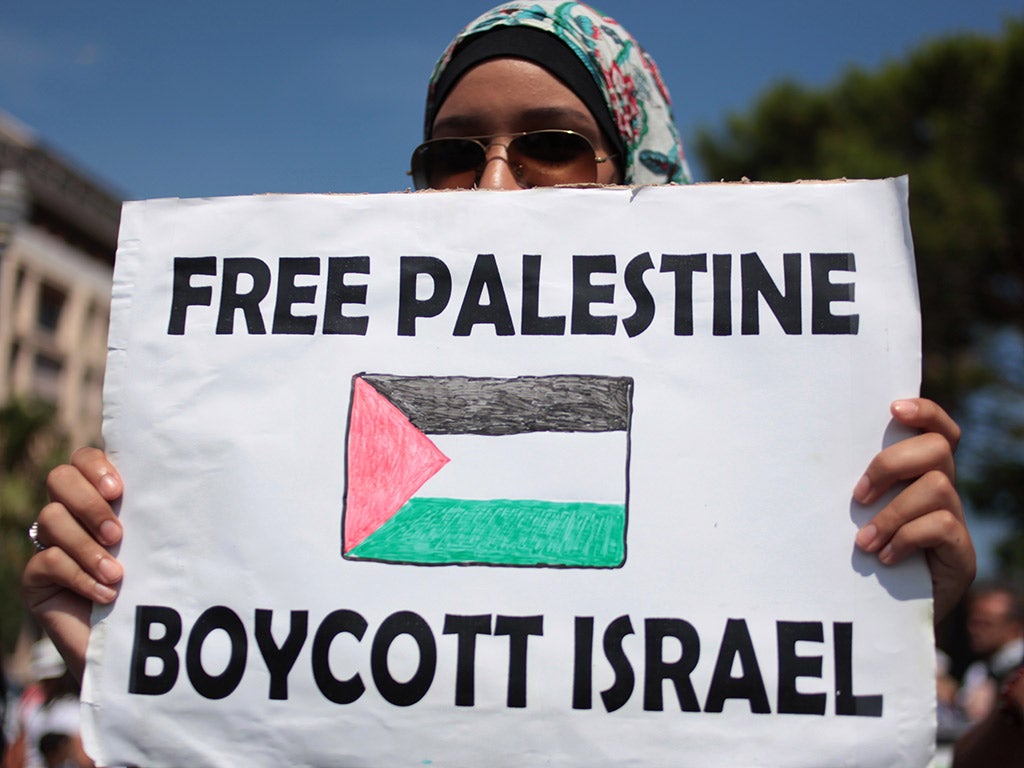G4S leaving Israel shows that the boycott, divestment and sanctions campaign is winning
The Foreign Office and the Business Department have issued guidance to UK businesses warning them of the reputational risk of operating in illegal settlements

Your support helps us to tell the story
From reproductive rights to climate change to Big Tech, The Independent is on the ground when the story is developing. Whether it's investigating the financials of Elon Musk's pro-Trump PAC or producing our latest documentary, 'The A Word', which shines a light on the American women fighting for reproductive rights, we know how important it is to parse out the facts from the messaging.
At such a critical moment in US history, we need reporters on the ground. Your donation allows us to keep sending journalists to speak to both sides of the story.
The Independent is trusted by Americans across the entire political spectrum. And unlike many other quality news outlets, we choose not to lock Americans out of our reporting and analysis with paywalls. We believe quality journalism should be available to everyone, paid for by those who can afford it.
Your support makes all the difference.G4S has finally announced that it will be selling its subsidiary, G4S Israel, “in the next 12 to 24 months”. The news has been greeted with jubilation from campaigners who have led a sustained boycott, divestment and sanctions (BDS) campaign against the organisation over the last four years.
According to a G4S spokesperson: "G4S provides and maintains technical equipment such as access systems, cameras and baggage screening machines in some Israeli prisons and at some crossing points along the separation barrier."
The domination of G4S’ annual general meetings over several years by protests against the company’s involvement in Israeli prisons was undoubtedly a factor in the company’s announcement two years ago that it intended to pull out of Israeli prisons.
Not only have many student campaigns convinced their universities to drop G4S, but globally many organisations – public and private – have dropped G4S. At the end of last year Labour’s National Executive Committee decided to end their conference security contract with G4S following a discussion about their complicity with human rights abuses.
G4S claim that its decision to sell its subsidiary had nothing to do with the BDS campaign. A spokesman for the company told Newsweek: “We have now got 65 businesses that since 2013 that have been identified for sale or closure, so Israel is actually just one of those”. “It is an entirely commercial decision.”
G4S weren’t the first company to be targeted by the boycott, divestment and sanctions movement. The campaign has already had a string of successes.
Veolia, a French corporation, came under the spotlight because of their involvement in the development of a tram system connecting West Jerusalem to Israel’s illegal settlements in occupied East Jerusalem.
This was met by a seven year campaign to persuade public bodies not to renew their transport or waste management contracts which, we’ve assessed, cost Veolia more than $20 billion. In September 2015, Veolia sold off all of its businesses in Israel. The company said at the time: “This transaction will contribute to Veolia’s debt reduction by around €250 million. It is part of Veolia’s strategy to refocus the Group geographically and to concentrate on areas where it can seize less capital intensive opportunities”.
Even an Israeli company, Sodastream, moved its factory out of one of Israel’s most notorious illegal settlements, after an advertisement for their product featuring the actor Scarlett Johansson led Oxfam to part company with her as their ‘ambassador’.
Other companies based in settlements live in fear of publicity. One company promised a human rights organisation to move their factory in order to avoid being mentioned in a report on companies operating in illegal settlements.
Even the Foreign Office and the Business Department have issued guidance to UK businesses warning them not only of the legal and financial risks, but also the reputational risk of operating in Israel’s illegal settlements.
Whilst trying to dismiss the importance of the boycott campaign, Israeli government defenders are focused on how to counter the boycott movement. They have even enlisted the support of British Cabinet Office minister Matthew Hancock who announced new government-imposed restrictions on the right of councils to make ethical procurement decisions – at a Jerusalem press conference with the Israeli Prime Minister.
One of their counter arguments is that Palestinians’ interests will be damaged as they will lose their jobs as a result. It is worth noting, these same arguments were employed to defend apartheid South Africa from the boycott campaign. In reality, as a World Bank report set out in 2013, the Palestinian economy loses $3.4 billion a year - 35 per cent of its GDP - as a result of the Israeli occupation.
Our advice to the Israeli Government is simple. If you want to end the boycott campaign, end your occupation of Palestinian land, and stop your human rights abuses.
Sara Apps is Interim Director of the Palestine Solidarity Campaign
Join our commenting forum
Join thought-provoking conversations, follow other Independent readers and see their replies
Comments